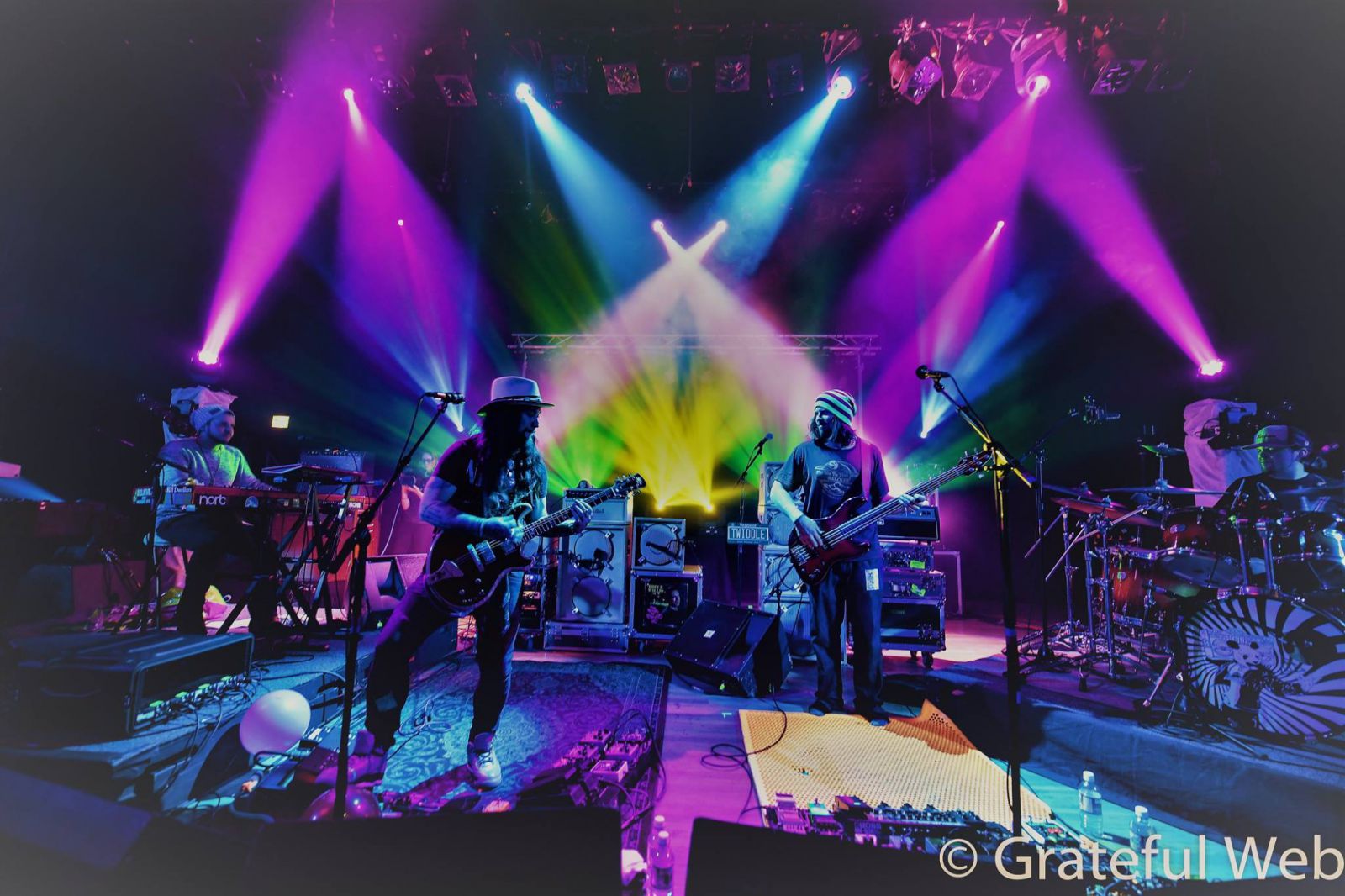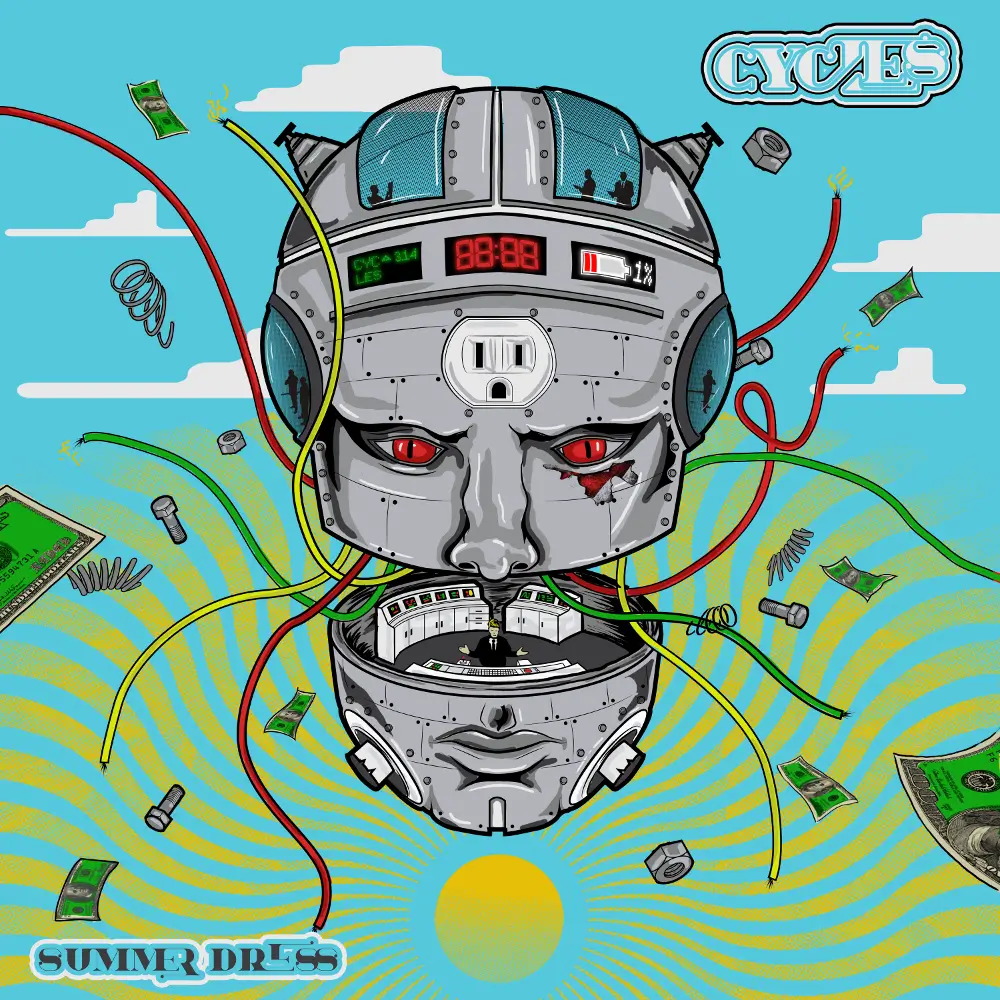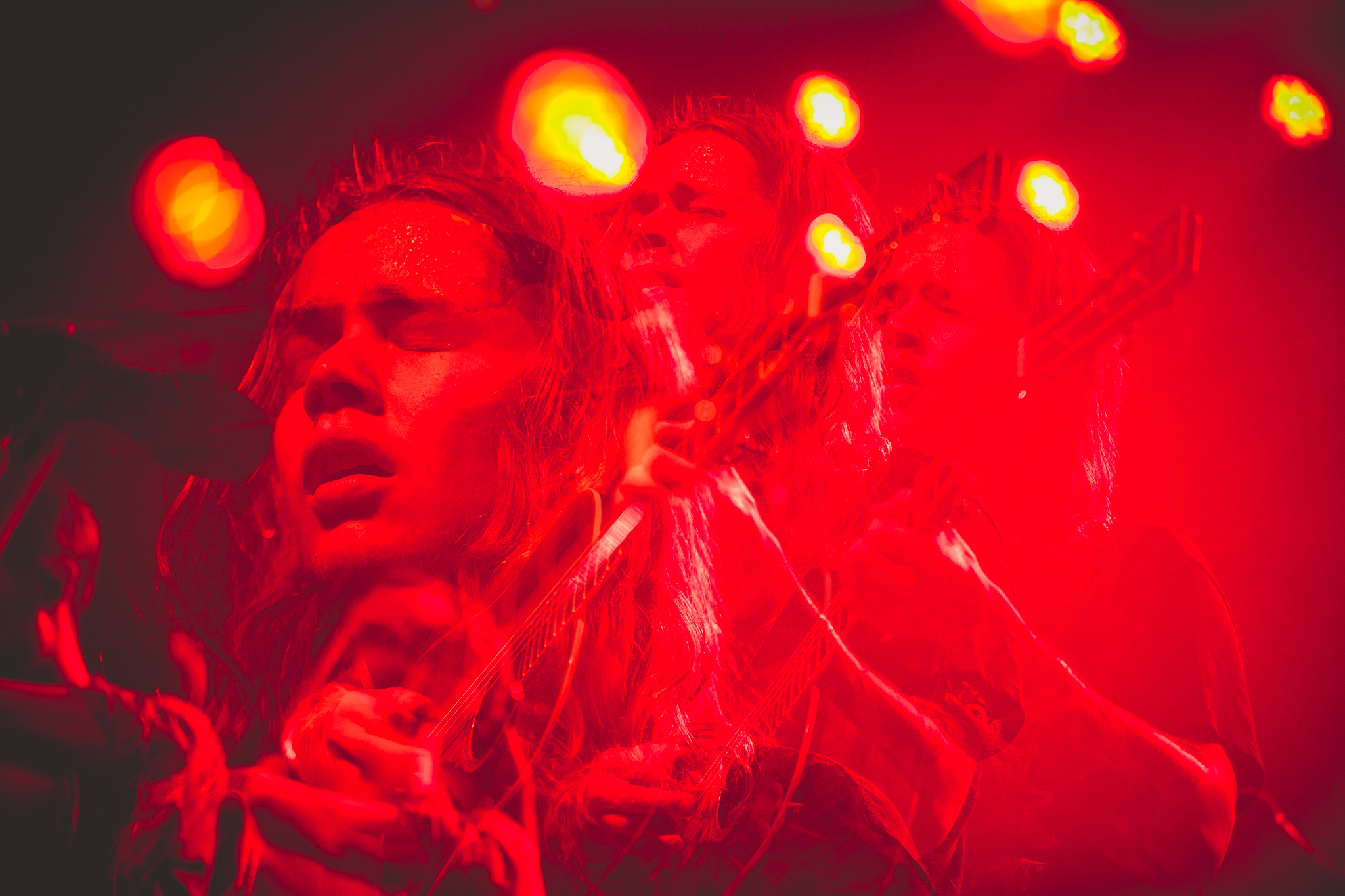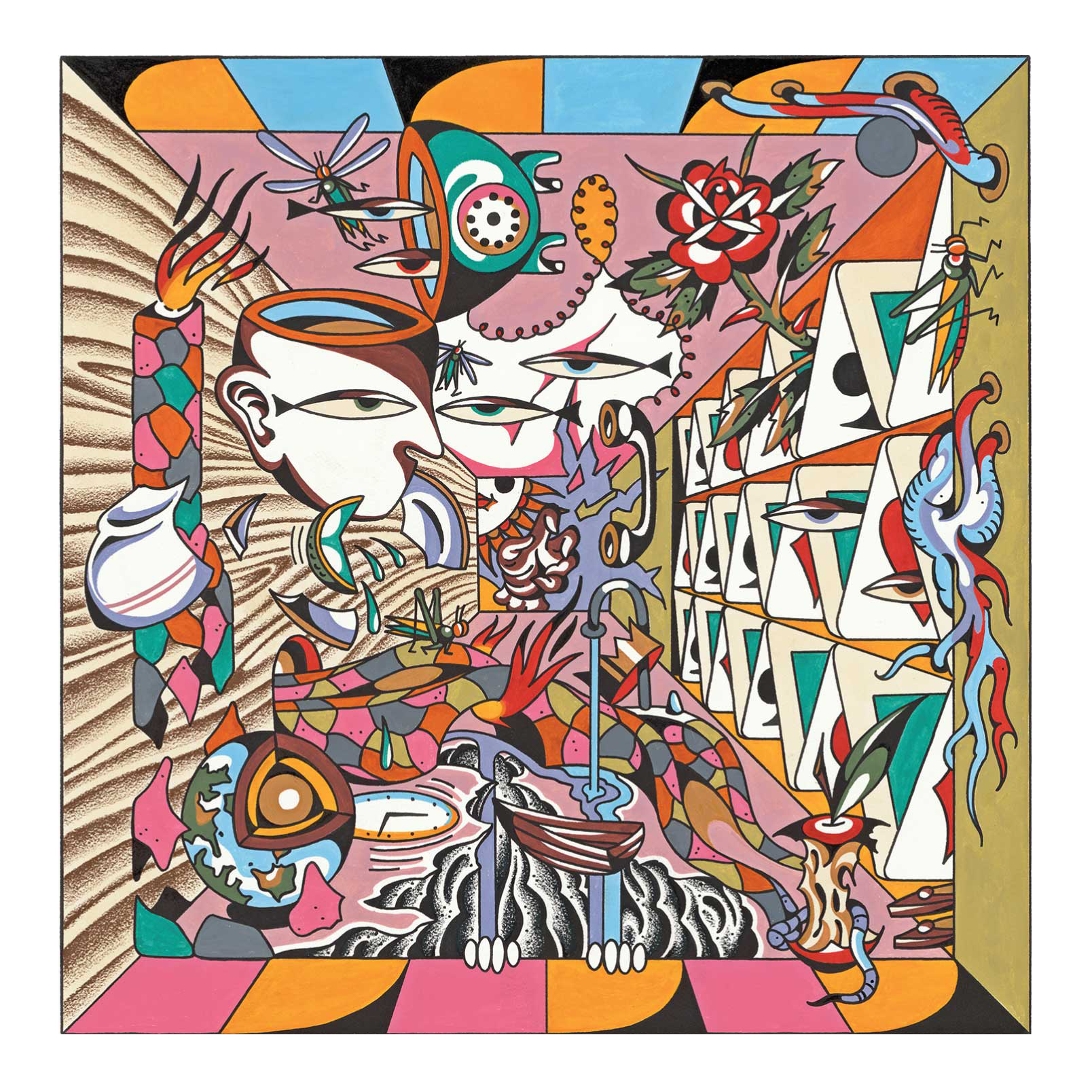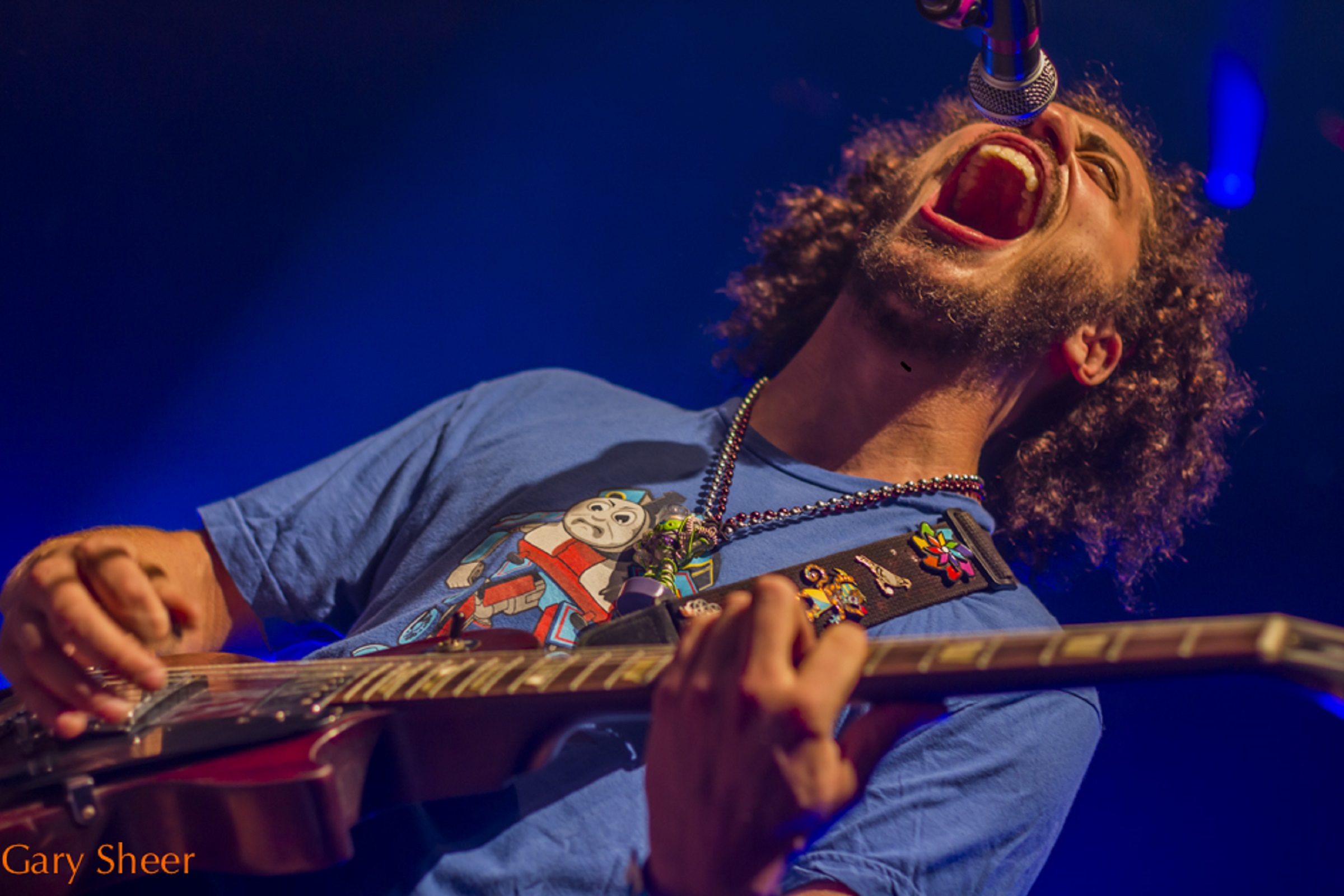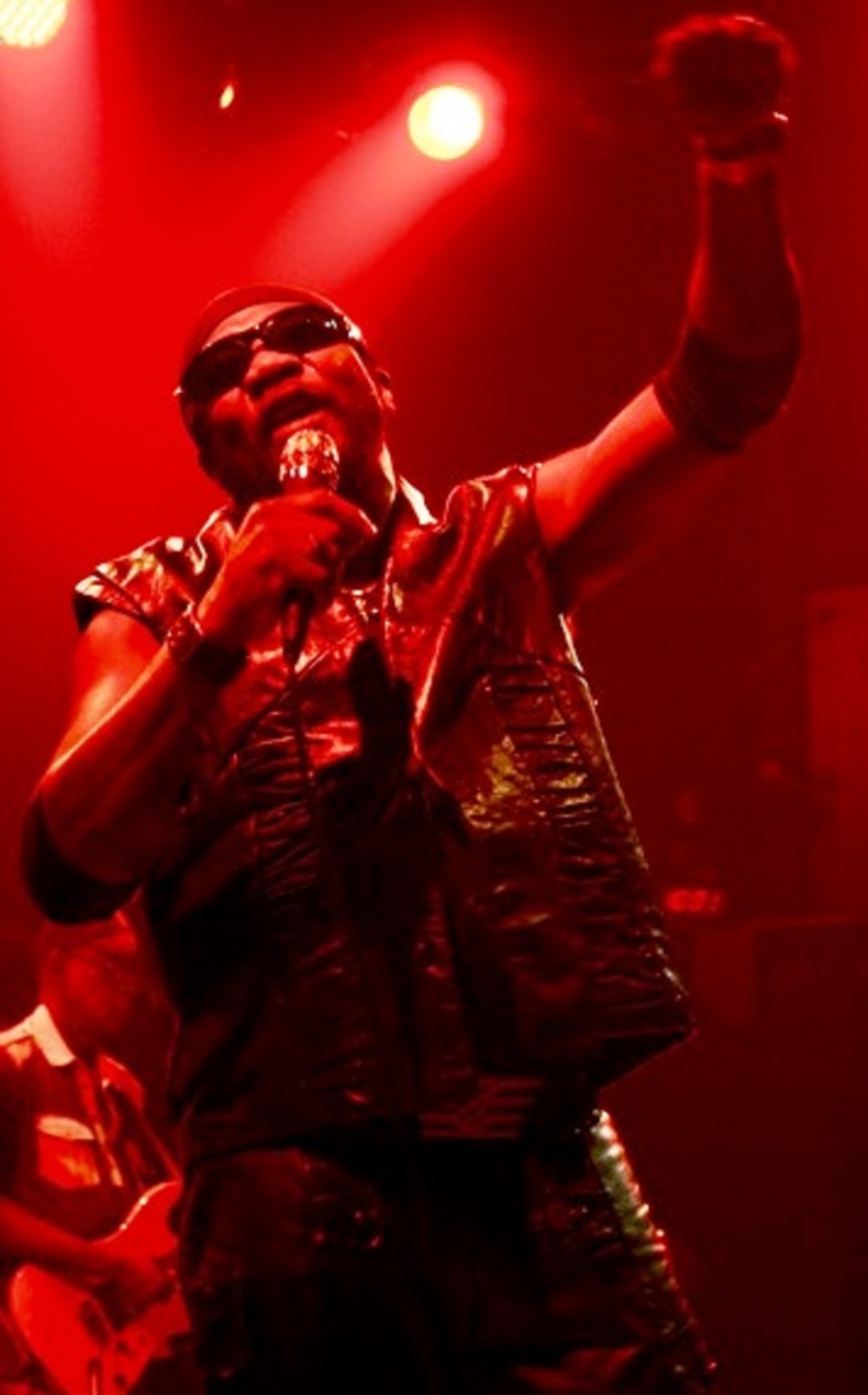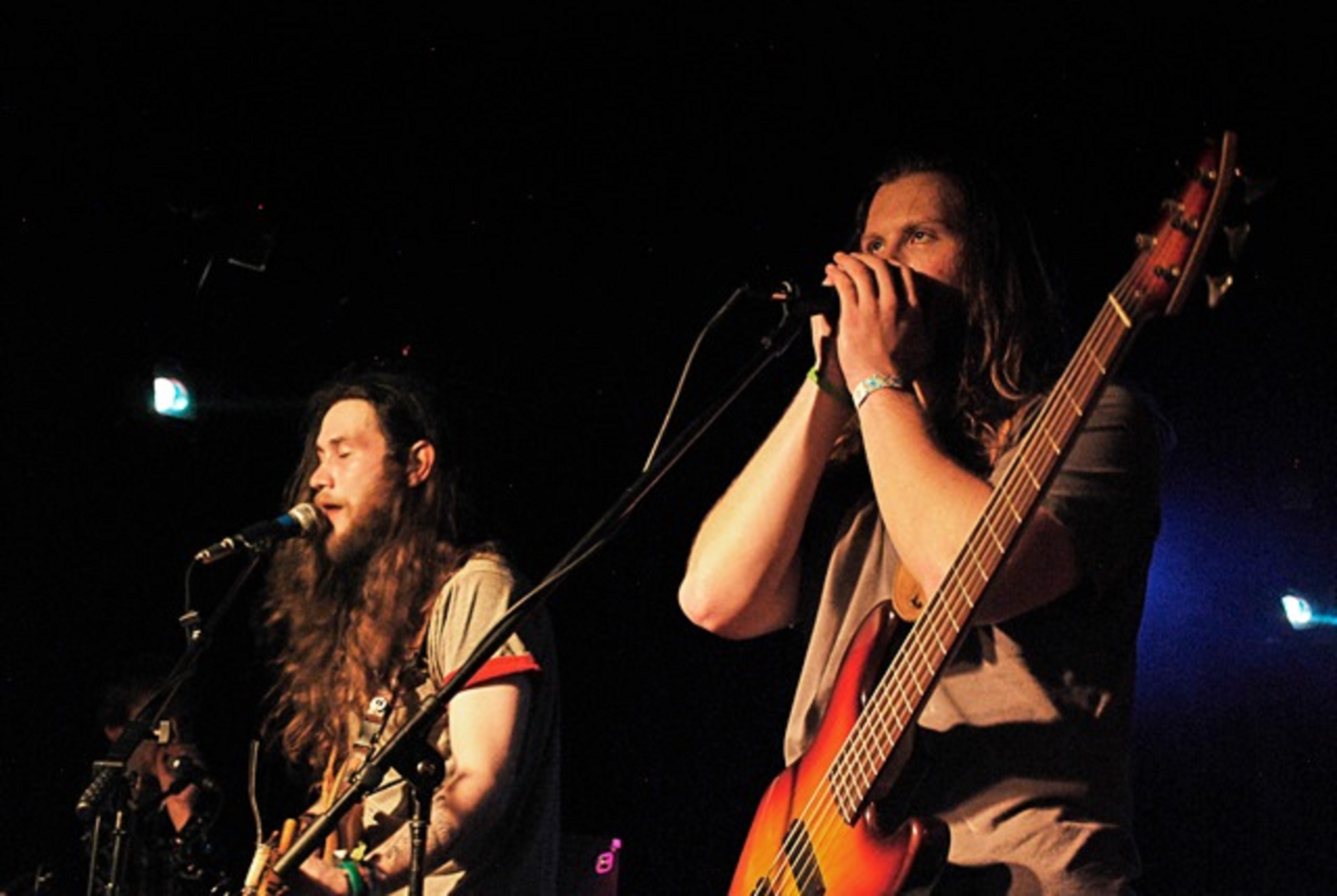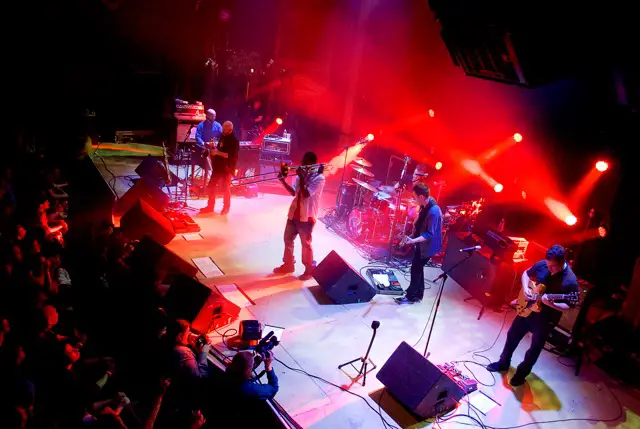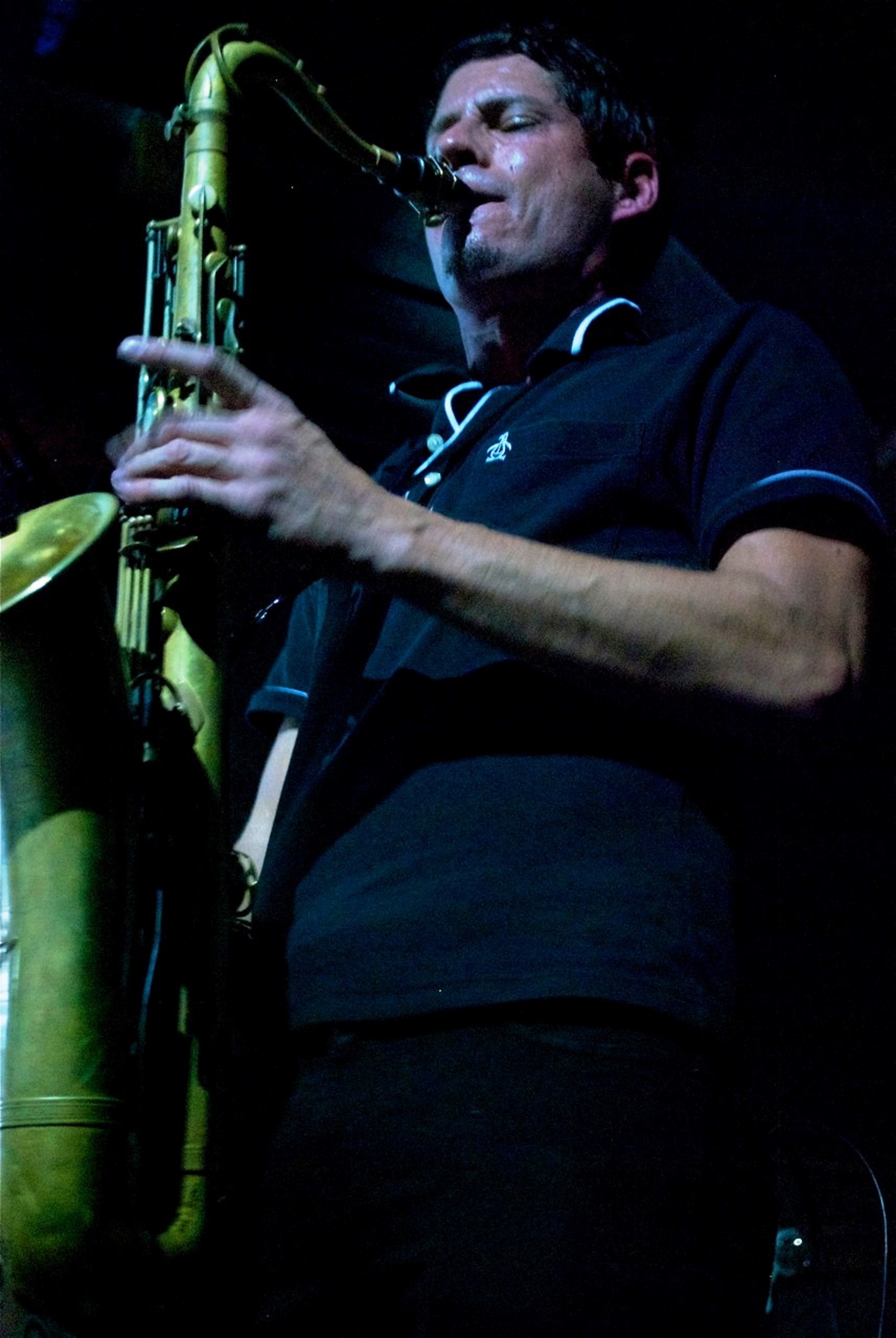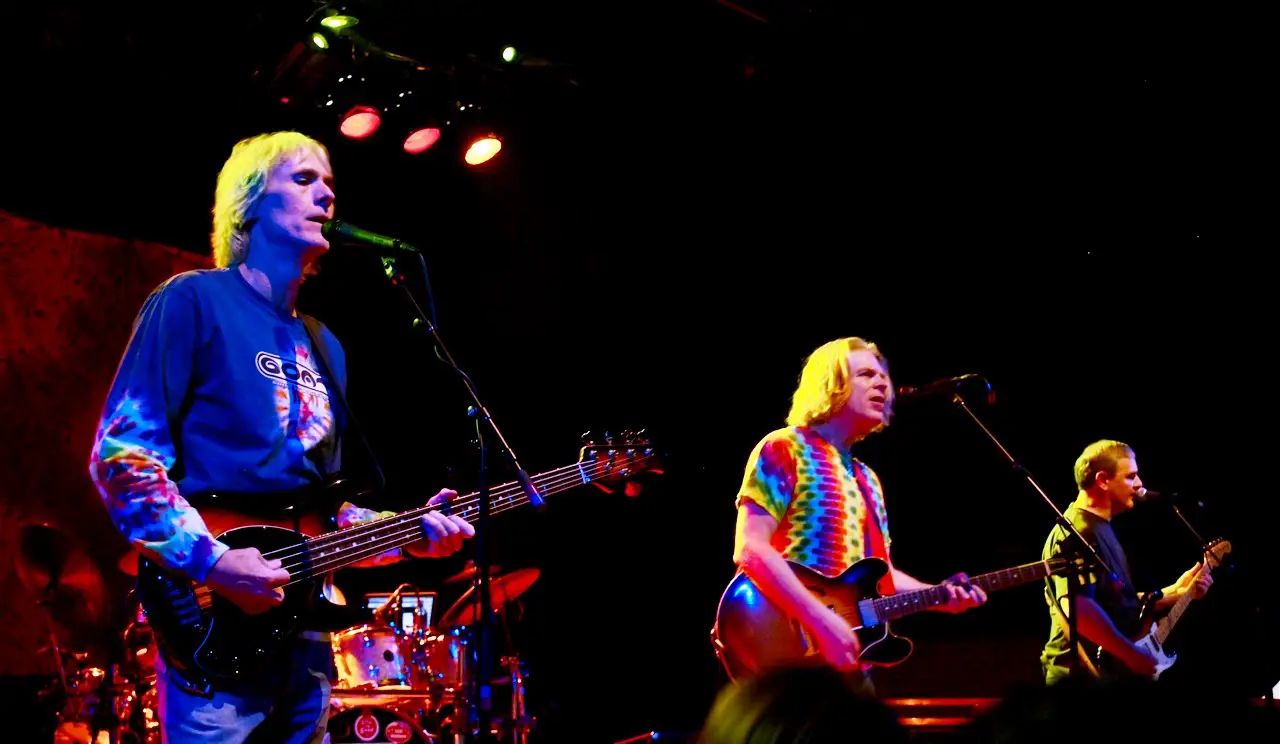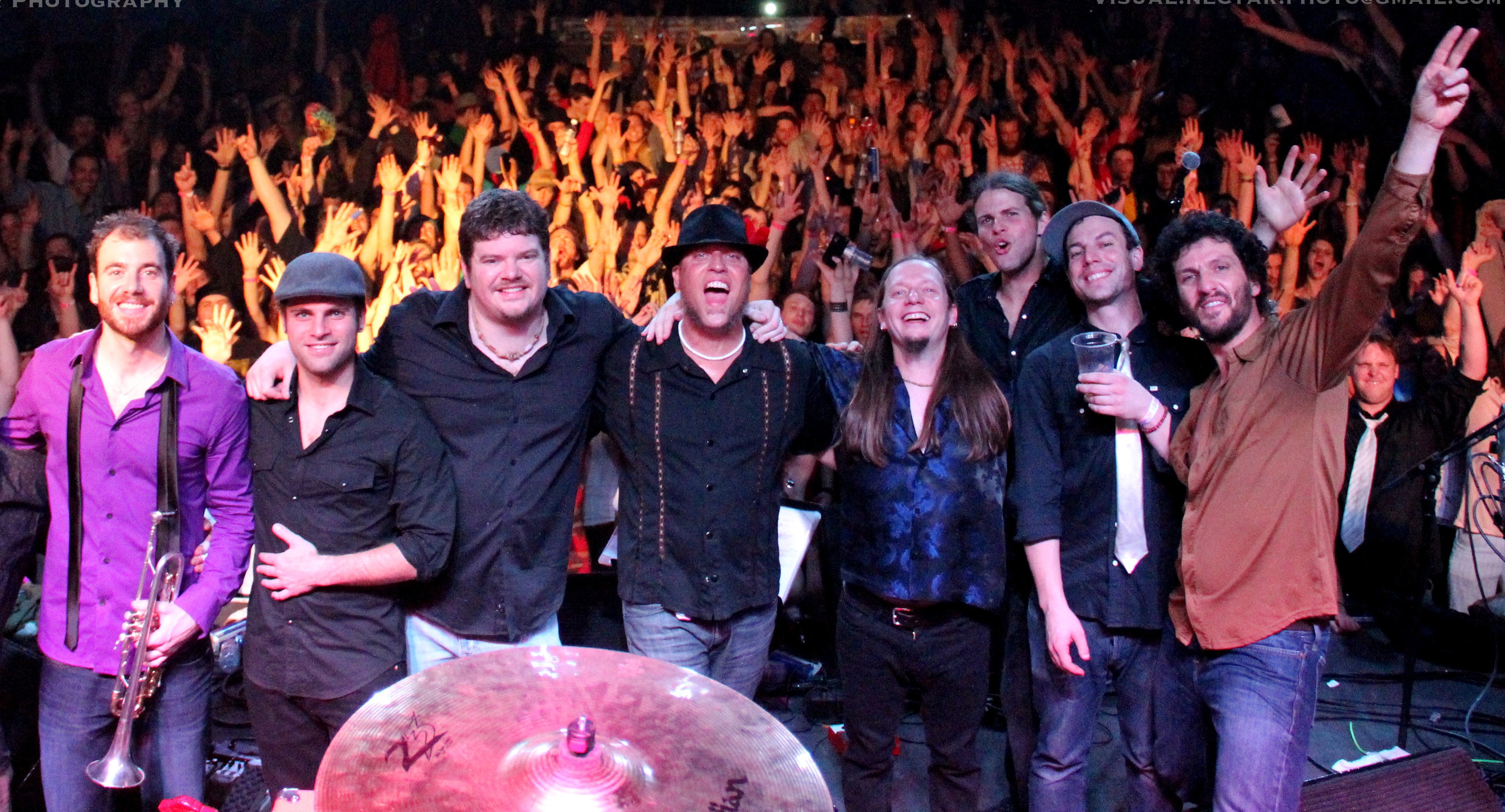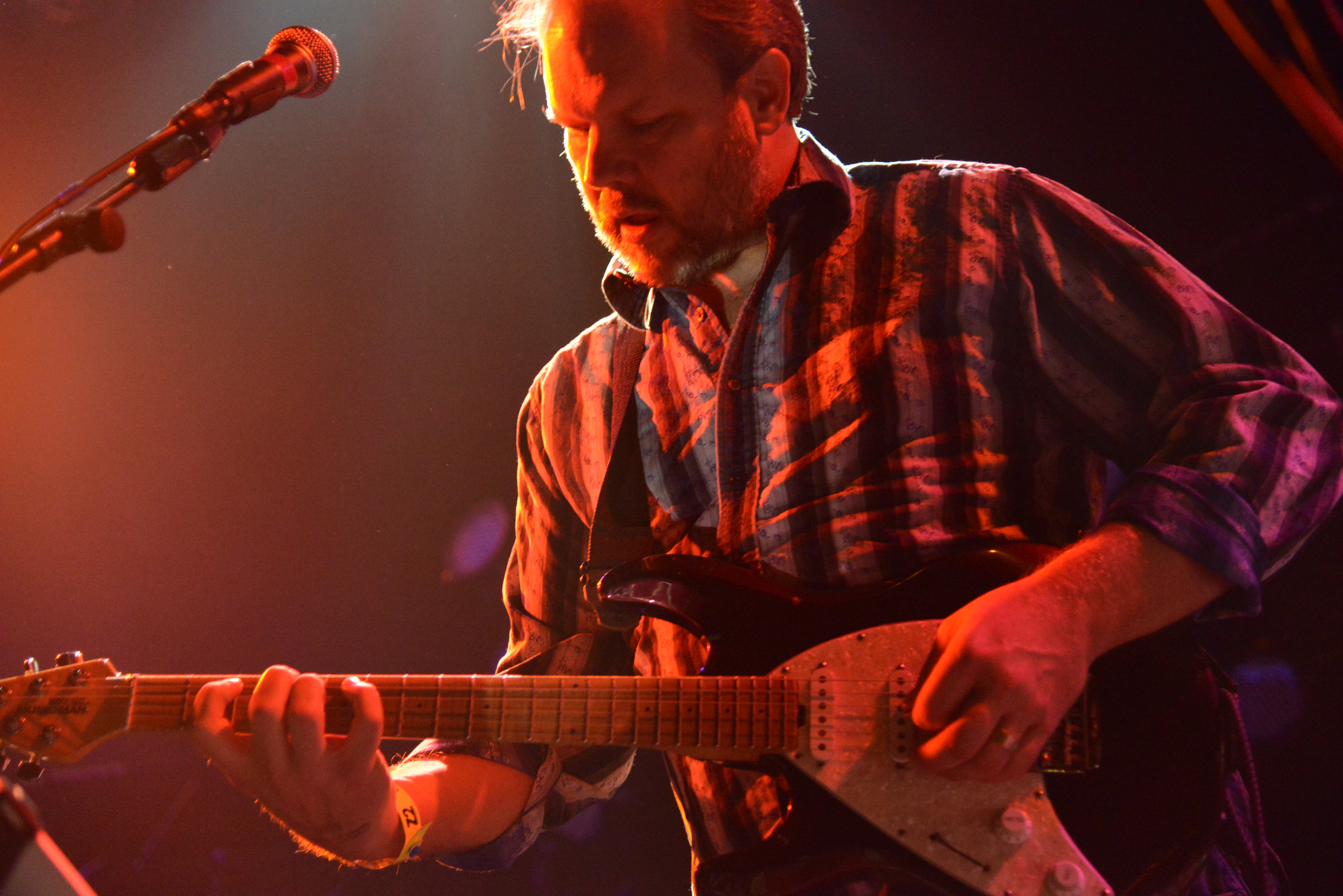This year, after hearing some friends preach Twiddle to me every opportunity they got, I caught the first chance to see them without having to go to SnowBall Music Festival. Before the show began I got the opportunity to sit down with the band and discus topics ranging from musical backgrounds and influences to the band’s experiences with their new label under Madison House, and the massive buzz they are creating that’s sweeping the country. We set up shop in the small room behind the stage and continued outside when the opener was sound checking. The questions went smoothly, and the band’s humble attitude and quirky humor made the experience that more enjoyable and informal. While the guys weren’t exactly used to getting interviewed, I have a feeling they will be soon.
GW: Can I get your musical backgrounds?
Mihali Savoulidis: I’m from New Jersey originally, and I started listening to Dave Matthews when I was like really young, and kind of got into acuoustic guitar playing. Then through that I got into Phish, String Cheese, and all that and wanted to play more lead. So, I took some jazz lessons with Steve Girardi, he’s a really good guitar teacher from Jersey, and I started listening to a lot of Ernest Ranglin who’s a Jamaican-jazz guitar player. So pretty much from listening to a lot of Ernest and going and seeing my favorite live bands like I figured out the style of guitar I wanted to play. I do a lot of singer-songwriter stuff now because I have acoustic gigs so some of the songs I’m writing now are more like that but I primarily play electric.
Zdenek Gubb: I grew up in Southern Vermont, back down the boondocks ….(gibberish), and I started listening to kind of almost metal…well it was really Pink Floyd and Korn and Primus that really got me into playing bass, and there I kind of graduated to Jeff Beck and the Beatles and Phish, really when I joined the band is when I got into more jam band kind of stuff, that was in high school. Now I’m a little more into the bluegrass thing, but my musical style changed throughout all different styles of music.
GW: How about yourself (Ryan), musical backgrounds and influences?
Ryan Dempsey: Uhh, I like the black eyed peas, except for everything musically they do. I started out listening to Bela Fleck and the Flecktones, once I saw them play live I wanted to play live, because they put on a great show. And I was into Phish but I met Mickey at school and I got more into that kind of music and String Cheese, but then started studying jazz in college and got into Miles Davis and Hiromi which is this Asian girl who just like has sex with the piano when she plays it. Its really sexy. Oh, and the Bad Plus, I love that piano player, he’s a big inspiration. But that’s as far as like being inspired by piano, but I just love the way Phish’s formula of improvisation, and String Cheese’s formula, like letting things go and find a place and come together through nothing idea. So that’s what I do it for, and would probably be bored if I didn’t have that, because that’s what really makes it for me.
Brook Jordan: I got my first kit when I was 10 and I was skateboarding a lot back then and was into like harder punk and hardcore music, and that’s what I started drumming on, even though I did jazz school in middle school or whatever. Early in middle school I was turned onto the Grateful Dead and Phish, and then I didn’t look back from there. I listened to those kind of guys and then once I met these guys, actually our first bass player was a big influence of mine on opening my mind up to music I’ve never heard of, but I also listen to singer-songwriter stuff too because I like to play guitar myself.
GW: What is it about reggae and funk that allow them mesh so well?
Zdenek: It’s the two styles of music that people always dance to no matter what, it’s just the way the rhythm works, people always can dance to it if the rhythms there and it’s tight.
Ryan: Well they are kind of the opposite of each other where funk is more of a down beat and reggae is more of the upbeat, but your still dancing to either the upbeat or the downbeat.
Mihali: As a band if you generally go into a reggae song people kind of get up and start moving around, I mean who doesn’t like reggae? And funk is the same way. Funk is the essential dance music that kind of started it all in terms of like really gettin’ down. I think naturally they go hand in hand if you can blend them well.

GW: What are some of your favorite acts to see live today?
Zdenek: Kung Fu.
Mihali: I like seeing Dopapod too.
Zdenek: Zappa Plays Zappa
Ryan: Zappa Plays Zappa, I love it more than Zappa…
Brook: Plus we all love seeing Phish again, no other band really compares, at least for me anyways is seeing them live. I would go see String Cheese more if they came to more East coast, but they don’t like the East coast.
Mihali: Yea, String Cheese is one of my favorite bands to see live period. I watched them a lot when I was younger but it’s hard to catch shows now because we have to come out here.
GW: Were you guys always going to be musicians or was it sort of a leap of faith for any of you?
Ryan: Ha ha it was for me.
Mihali: I always figured that’s what I was going to do, it was the only thing I was good at.
Ryan: I mean I wanted to do it. It was always like being a basketball player, but once I saw Bela Fleck…
Mihali: When I met you, you wanted to do movies didn’t you?
Ryan: I did, I graduated with a film degree but then I met Mickey, and if I hadn’t have met Mickey, I wouldn’t have been a musician.
Mihali: For the three of us (Zdenek joined the band in 2007), it was like a moment where it clicked during one of the first couple shows, watching the response we got.
Zdenek: When I was 13 I saw Victor Wooten play, it was my thirteenth birthday and he jumped out on top of the amp while they were starting to play and I was like, yep, that’s what I want to do. I remember driving home and thinking that is what I want to do for the rest of my life. So, then these guys picked me up when I was 17 as a senior in high school, and I was like, not going to school, nope.
Mihali: I went to college to find a band and get it started, I had no intention of actually going to college.
Ryan: He actually didn’t go to class for like a whole semester and we just wrote music in the dorm.
GW: What is yall’s definition of progress, and how much of it do you think you have made since your formation?
Mihali: For me it started off as just like alright, I want to play at that venue and then six months later is was like Nectar’s and then we got into Nectar’s and then it was like oh it would be cool to play at Higher Ground which is a bigger venue in Vermont and we went from the small room to the big room. You set your goals, like for us coming out here to play the Fox theater was a goal for us, so maybe the next one is the Boulder Theater.
Brook: And there’s also musical progression, as well. From people I talk to they say that we continue to get better.
Ryan: If you listen to old recording until now there’s a noticeable difference. And Zdenek changed the game too though.
Brook: There’s also signing to Madison House, getting a full merch table.
Zdenek: I think the big thing to notice with progress is not just the number of people at shows but more of the amount of people who are paying attention. Because, you know if you have a bunch of people at a show it doesn’t really mean that much if they’re not paying attention, they’re just there to party. We’re not truly progressing until people are really paying attention and feeling it.
Ryan: I think playing with John Popper from Blues Traveler the other night was pretty huge
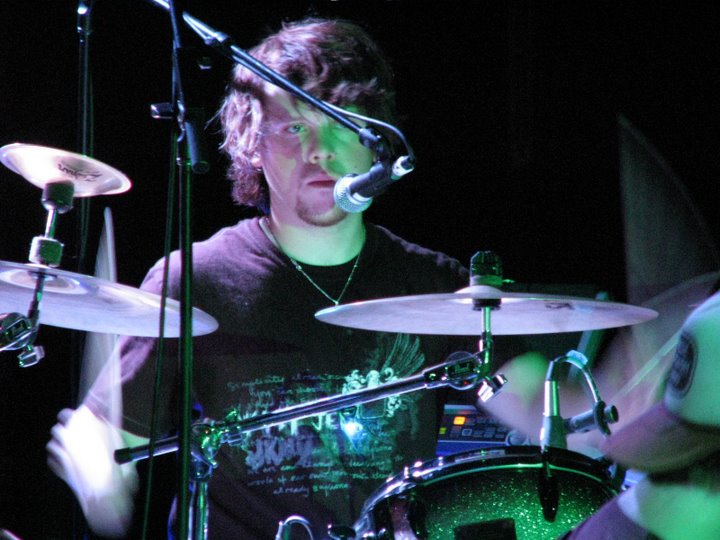
GW: Can you guys tell me about signing with Madison House?
Zdenek: No.
(ha ha)
Mihali: Because I listened to String Cheese all growing up I was well aware of Madison House all through my younger years, so when we got to the point when we realized eventually we will have to start using a booking agent and stuff, they were always at the top of the list for me and us, that’s what we always talked about, it was our goal.
Brook: One day I got an email from one of our agents now that literally just said, “Who’s booking for you?” and that was it. I thought it was a joke, I’m looking at my phone like, are you fucking kidding me right now?
Mihali: And they’re a super cool company too because they contacted us early and said hey guys we thing you’re great but we still think there’s a little bit of work that needs to be done before your at the level that we pickup, and they kind of pushed us through til we were at that point. They gave us advice, we could call them if we had certain things we wanted to know. They were patient with us.
GW: What’s your mission, what keeps you guys touring hard?
Mihali: To grow the fans really, and get the music spread out as much as we can.
Zdenek: It’s also the belief in real music, not just electronic, built by a computer music, and we respect that but we want to keep the vibe of real music going. For me it’s like, I don’t know what I would do if I wasn’t in the band, but I would want to do something for people. The more we play, the more fans we get, the more we realize we are making people happy.
Ryan: And that’s a great thing to do for a living.
GW: How was SnowBall? Did your organic sound have any trouble satisfying the whomp-heads?
Mihali: Um yeah, SnowBall was a lot of whomp-heads.
Brook: But we filled up the tent!
Zdenek: We did better than we thought we would.
Brook: And there were people in the front row screaming Twiddle so some of them had seen us before.
Mihali: We were nervous though I’ll tell you that.
Ryan: But we did throw in a little electronic.
GW: What’s the songwriting process like in the group?
Mihali: Most of the lyrics I write, Brook has a few songs, Zdenek wrote a song with us. In the beginning, most of the wacky instrumental stuff was me and Ryan, all of the very intricate kind of harder stuff to play, we wrote. And if I am having a really hard time, Ryan is the best person to sit down with because he knows infinite chords and progressions and he can write the most beautiful chords in three seconds and then it makes it easy for me to put lyrics to it. So that helps, and Zdenek writes on his own as well, actually some of our more popular songs, Doinkinbonk.
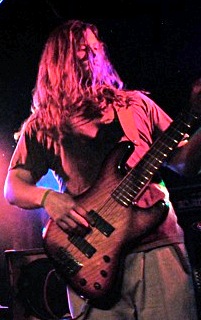
Zdenek: Well also these guys have given me the freedom to write my own bass lines, we all come from a lot of different musical backgrounds and if we all feel it’s right, it’s probably right.
Brook: And it’s cool too because they let me write some songs on guitar.
Mihali: Also when he writes his songs he sings them which gives the band a different sound, like the lyrics aren’t all coming from me.
GW: I want to tell y’all I found out about you by people just raving about your live shows, and there are people traveling all over Colorado for three nights to see you guys, and when I asked a couple of random people about you guys, more than one person has said something to the magnitude of, they are the next Phish.
[Everyone at once]: John Popper said that!
Zdenek: He goes, you’re the next Phish…it’s a good thing. For the longest time we though, let’s not talk about Phish in our interviews. We love Phish, but we’re not trying to sound them, we are trying to sound like ourselves. But they are a huge influence!
Mihali: The problem is that we’re the same instrumentation and we’ve all listened to that band probably more than most other bands, so it’s definitely instilled in our blood, but if you put the bands side by side we don’t sound anything alike. But it’s very easy to just say, oh they sound like phish and that’s what we don’t want . We don’t want people to assume that we are exactly like them and we’re from Vermont and that’s that. The music if really different, but if you listen to the jams, yes, you’ll get some of the same energy and stuff like that but it’s definitely like comparing Phish to the Grateful Dead.
Ryan: It’s the tension and climax that I think we are most compared to.
GW: Your sound at some points can become pretty distorted and synthy, but never quite as heavy as bands like Umphrey’s McGee are going these days, are there certain constraints you guys place on each other to maintain a natural instrumental sound?
[Everyone at once] Nope.
Mihali: I mean I don’t think I would be comfortable in us all getting up on computers, I think that would draw the line for me. But, I have a lot of respect for the kind of natural electronic stuff like The New Deal, and bands that are playing their instruments and making the music you know? They’re not just going through Ableton or whatever. That stuff is not easy to do, especially being a drummer, being on a click like that is definitely not easy.
Brook: Yeah, the New Deal. They were originators. They would do shows and wouldn’t play songs, they would just jam a whole show.
Zdenek: Hand signals the whole way through.
Mihali: It’s like String Cheese, I love them to death, they were my favorite band growing up, but it was more difficult to thoroughly enjoy all the shows when they would get off and go right into the computer shit, and Kang would put his thing down and turn around and get on his computer or whatever.
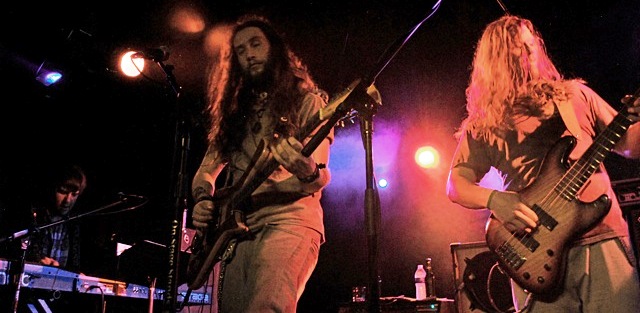
GW: They’re doing that a lot now? Is it because of EOTO?
Zdenek: Well they’re just catering to the young crowd
Ryan: Well they’re also catering to the new technology. It’s like when Miles Davis tried to experiment with new things, that’s what they are doing. It’s new and that’s where music is going kind of.
GW: What is it about the quartet that allows y’all to produce your ideal sound?
Brook: We like horns and stuff too, but I don’t think any of us really like one horn in particular that we would add to the band. I’m against adding a percussion player…because I’m a little bitch.
Mihali: I think the sound comes from if anything, the more you play with a group of people you just get comfortable with they’re playing.
Brook: I feel like also at times, our music can get really chaotic and cluttered but at the same time we all have our own time to do our own thing and adding another person just adds to the difficulty of letting everyone do their own thing and shine.
GW: When you guys are improvising on stage, are there any special connections between certain band members or is everybody more or less equally involved with each other?
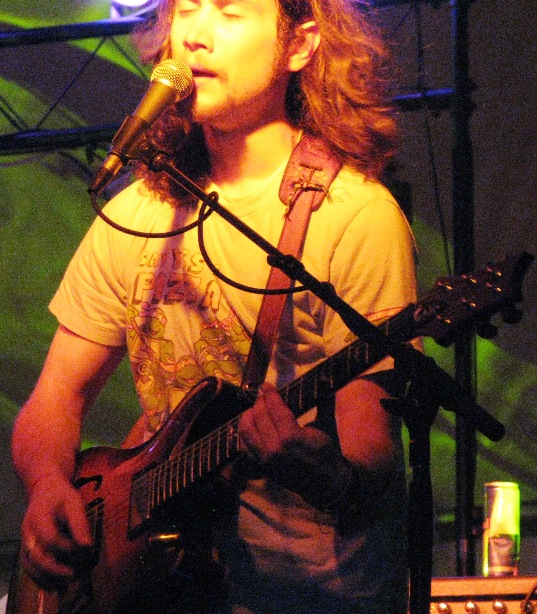
Mihali: Ryan and Zdenek.
Ryan: Zdenek and I do have…well to create music on the spot we try to…
Zdenek: Go out of the ordinary. We use some hand signals to go through…
Ryan: Intervals.
Mihali: Brook’s playing in the back and I’m usually floating on top.
Zdenek: The bass can control how Mickey sounds, if Mickey can flow on a riff up top, and Zdenek were to switch…I have to be with Zdenek because his bass note will decide any emotion of…
Mihali: But you guys usually switch to something I’m playing.
Ryan: Yea, we won’t go way out of the tonality.
Mihali: I think something else we try and stick to is that we really try and improvise on a lot of our songs and just from nothing, from one chord out. Whereas a band like Umphrey’s who jams too, but it’s a little more structured, like they kind of know the chord progressions and what’s gonna go into it. Someone’s taking a solo while the other people are vamping, whereas with us it’s just kind of like lets go for it and see where it will go. It could suck terribly, but sometimes you hit gold, and that’s when it makes it truly awesome. And you know that song will be different than any other version of it, and hopefully that’s why people come out to see us; because they are gonna hear something new.
GW: Any studio work coming up in the near future?
Mihali: I think our next thing is a live album. That’s probably gonna be what come’s out next from us before another studio.
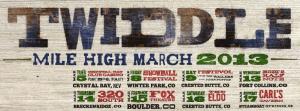
GW: Give me one of your favorite recent Twiddle memories.
[Everyone at once]: John Popper, meeting him, and playing Blues Traveler tunes with him.
GW: A friend who’s a big Twiddle fan wanted me to ask you; what is Hattie’s Jam about?
Mihali: My buddy who lived in Colorado. He’s my best friend and he passed away a couple years ago. I wrote the song Hattibegan McGrat which was a bluegrass tune before he died, so he got to hear it a bunch. Never got to hear the band do it but yea, he’s pretty much my best friend and he passed away in Thailand. It was meant to be a full song, but I played it before When It Rains It Pours one day and it just kind of seemed like it went hand in hand, and both of those songs kind of came out of tragedy so they both have that similar vibe that people can relate to.





